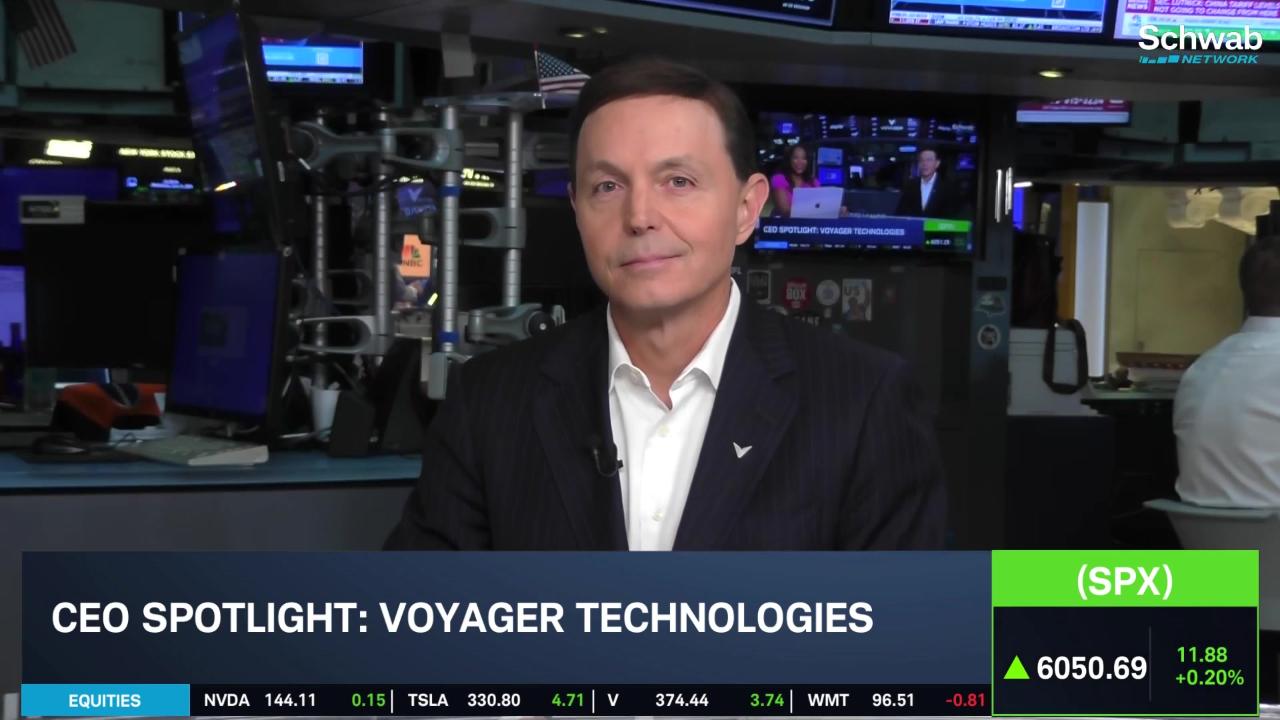- Market Minute
- Posts
- Market Minute: Weekend Spotlight: Voyager (VOYG) CEO on IPO & the Space Business
Market Minute: Weekend Spotlight: Voyager (VOYG) CEO on IPO & the Space Business

Voyager Technologies (VOYG) debuted on June 11 and jumped over 80% in its first day of trading. CEO Dylan Taylor joined Trading 360 to discuss its IPO and how Voyager is changing the space game.
“Our economy really is driven by space-based assets,” he argues, citing cellphone and internet access. “There’s an entire infrastructure layer in space that’s going to make life here on Earth better, and that’s the part of the market we’re playing in.”
Founded in 2019, Voyager bills itself as a national security and space infrastructure company, boasting 500+ customers and 1,240+ “customer missions flown to ISS.” Hungry and moving fast, it has made seven acquisitions since its founding, expanding its capabilities.
Private space companies have multiplied in the last few decades, with SpaceX and Blue Origin some of the best known – though not traded on the open market. They do everything from building and launching rockets to landing probes on the moon (Intuitive Machines (LUNR)).
Major U.S. companies have been involved from the very beginning of the Space Race: Boeing (BA) and IBM (IBM) helped build the 1969 Saturn V, which launched the Apollo 11 to the moon!
Starlab is Voyager’s highest-profile project: a next-gen space station “that will ensure a continued human presence in low-Earth orbit.” It is a joint project with Airbus, Mitsubishi, and MDA Space. NASA awarded it $217+ million for the project.
On Voyager’s website, you can watch a ‘virtual walkthrough’ of the future space station. Starlab aims to replace the ISS, which is decommissioning in 2030. It aims for a 2029 launch – SpaceX will assist with the rocket that will propel it to space.
Other partners Voyager has announced for the mission include Palantir (PLTR) for AI and data technology, Hilton (HLT) to develop “space hospitality crew headquarters” and potential “tourism opportunities,” and Northrop Grumman (NOC), which will use its Cygnus spacecraft to resupply the station.
In Voyager’s prospectus, it claimed $144.2 million in revenue in 2024 and $34.5 million for the three months ended March 31, 2025. It believes its total addressable market is worth $163 billion, and expects that to grow as space becomes more important to national security matters.
Along with NASA, Voyager also has contracts with the U.S. Air Force. NASA made up 25.6% of its revenue last year, driven by the Starlab contract. Lockheed Martin was #2, at 17% of revenue, and Airbus and the Air Force made up 8% respectively. It reported a backlog of $200 million at the end of 2024.
Voyager’s Air Force contract is for $900 million, to develop a “cost-effective intelligence, surveillance and reconnaissance system.” It’s not just focusing on the hardware – Voyager means to integrate AI and cutting-edge software as well.
“We’re very keen on anything related to smart missile defense technology,” Taylor says, especially connected to President Trump’s Golden Dome idea, first reported in January. Reuters wrote on May 20 that Trump had “selected a design” for the $175 billion missile defense shield. He also sees software development as a growth vector. Voyager is looking to work with international governments’ space programs as well.
Risks it identifies in its prospectus include depending heavily on a single customer (the U.S. government), a lack of profitability so far, and both financial and technological uncertainties around its Spacelab mission. However, Taylor isn’t worried about DOGE cuts impacting its contracts.
Shares have fallen since its IPO, down 30% from its opening-day high of $73.95, and are trading around $52.26. However, this is still well above the $31 IPO price.
Watch the full interview below:
Video Spotlight
Featured Clips
Tune in live from 8 a.m. to 5 p.m. ET, or anytime, anywhere, on‑demand.
Or stream it via thinkorswim® and thinkorswim Mobile, available through our broker-dealer affiliate, Charles Schwab & Co., Inc
Please do not reply to this email. Replies are not delivered to Schwab Network. For inquiries or comments, please email [email protected].
See how your information is protected with our privacy statement.
Charles Schwab and all third parties mentioned are separate and unaffiliated, and are not responsible for one another's policies, services or opinions. Schwab Network is brought to you by Charles Schwab Media Productions Company (“CSMPC”). CSMPC is a wholly owned subsidiary of The Charles Schwab Corporation and is not a financial advisor, registered investment advisor, broker-dealer, or futures commission merchant.




